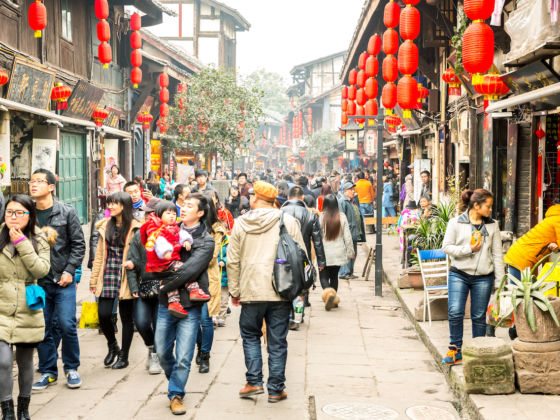On Tuesday, January 22, the news reported the first case of coronavirus on US shores. By January 26, after two more cases were reported, the Los Angeles County Health Department had to release a statement reading, in part, “People should not be excluded from activities based on their race, country of origin, or recent travel if they do not have symptoms of respiratory illness.” There are now a total of five reported cases in the United States.

Racist Panic Over Coronavirus Will Not Help the People of China
Still, as tends to happen in cases of the sudden and massive outbreak of an unfamiliar disease, panic is growing — and spreading fast. We saw it with SARS in 2003, which ultimately killed 600 people in China and Hong Kong, and hundreds more around the world. This time, around 2,000 people are already infected by coronavirus; 170 of them have died. The World Health Organization has yet to declare the situation a global health emergency, but no one can be faulted for feeling, perhaps, a tinge of fear.
Of course, in the United States that fear might sound a little hypocritical, too: In 2019, Clark County, Washington, experienced a measles outbreak that infected 53 young children, prompting the governor to declare a state of emergency — the greatest number of cases since 1992, according to the CDC. One study placed the blame squarely on a resurgence in dangerous anti-vaccine rhetoric.
The unfamiliarity of conditions like coronavirus and even measles make them seem even more terrifying, but it’s actually the most familiar virus of all — the flu — that poses the biggest risk of all. In 2019, the flu was responsible for 34,000 deaths in the United States, and yet only half of Americans opt to receive the vaccination that will prevent it.
These cases bring to mind an uncomfortable question: From where, exactly, does this panic over coronavirus stem? Are we afraid of our children getting sick? Or do some Americans still cling to their deep-seated racist fear of an Asian menace? Perhaps it’s some combination of both. But in this country, we have easy access to inexpensive (oftentimes free) and painless vaccines that prevent disease in our homes and those of our neighbors. If all Americans feared was illness, wouldn’t everyone flock to the pharmacy? Instead, researchers in the same measles study found that since 2014, “vaccine opposition” has only increased.
That pointed statement from the Los Angeles Department of Health should ring in your ears: “People should not be excluded from activities based on their race [or] country of origin.” Since the outbreak of coronavirus, prejudice against Asian people has become so overt that a government organization had to speak out about it.
The message is clear: Chinese people are being blamed for this outbreak — not the government that is supposed to be managing it. Like a sickness itself, racism bleeds into every corner of this crisis: As Bettina Makalintal pointed out in Vice, concerns that the virus originated in markets where carcasses of animals like ostriches and hedgehogs are sold is “fueling fears about the ways Asian people eat” — a classic racist trope that has existed since the 1800s. This vitriolic racism is not limited to the western world: Signs have even begun popping up in the windows of restaurants in South Korea banning Chinese people.
In Canada, parents at a school district in Ontario signed a petition asking that students who had recently returned from China remain “isolated” for at least 17 days. This ban would, of course, affect children who have family in China, who have immigrated from there, the most. This stance, though perhaps well-intentioned, does not take into account that travel bans and quarantines do not stop the spread of disease.
In 2014, during an outbreak of Ebola in Africa, the director the CDC wrote that he did not support a travel ban in Africa. Quarantining Africa, he argued, would make it harder for medical professionals to address the disease and for patients to seek help, creating an even larger humanitarian crisis than the ban sought to stifle. Americans abroad would struggle to get home. And crucially, people would still move between borders either seeking escape or asylum, spreading the disease as they went — the difference is that those travelers would be impossible to track.
Travel bans have far-reaching, devastating consequences for the countries where they are instated. Tourism and trade to the country where the disease originated immediately cease — regardless of whether or not it is easily transmitted. Even once the disease is under control, fear and panic regarding the safety of said country will continue on so that it might take years for the tourism industry to recover. One study found that the GDP of Sierra Leone and Liberia dropped significantly in the years following the Ebola outbreak due to a lack of government revenue.
Fear, it seems, is a powerful drug. It has forced us to turn on our fellow humans, to see the people of China not as individuals but as an infected mass, ready to strike. But fear obscures the truth: The families quarantined in Wuhan, a city of 11 million people, are likely more afraid, and for better reason, than anyone in the US. They are reportedly being crammed into hospitals amidst a food shortage, worrying every day that their children or parents or husband or wife might be infected next. They are not tropes, stereotypes, or statistics. These people deserve our aid money, our research, our doctors. They do not deserve to be cut off from the world, alone, as they suffer. This disease is frightening. But the world doesn’t need more fear right now. It needs compassion — compassion that will, I hope, lead the rest of the world to see how they can help end this crisis rather than hide from it.